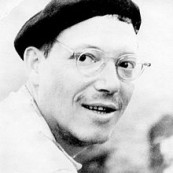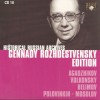Composers
Prince Andrei Mikhaylovich Volkonsky also Andrey, André, Mikhailovich, Michailovich, Volkonski, Volkonskiy, etc. (February 14, 1933 in Geneva, Switzerland – September 16, 2008 in Aix-en-Provence, France) was a Russian composer of classical music, conductor and harpsichordist. He was a key figure in Early Music Revival in Russia.
A descendant of a Russian aristocratic princely family in exile, he was born in Geneva in 1933. As a child he played his improvisations to Sergei Rachmaninov. Then he studied piano with the legendary Dinu Lipatti. The Volkonsky family resettled in Moscow in 1947. From 1950 to 1954 he studied at the Moscow Conservatory under Yuri Shaporin, but was expelled for breaking some minor disciplinary rules. In 1956 Volkonsky began the career of a harpsichord player and a conductor. He pioneered performing renaissance and baroque music, which had hitherto not been played in the USSR. In 1965 he founded an ensemble of early music, called ‘Madrigal’.
He was among the first Soviet composers who began experimenting with twelve-tone and serial techniques. An early work in this style was his piano suite "Musica Stricta" (1956). His works greatly influenced his colleagues. Composing such music at that time was an act of courage: it was a protest against the suppression of freedom, and specifically against the requirement that the composers in Soviet Russia followed the narrowly-prescribed doctrines of the Socialist Realism. It is not surprising that his music, attempting at a real renewal and enrichment of the musical language in Russia, was banned from performance. Volkonsky said that he had been fighting for 25 years to establish and preserve his artistic individuality in Moscow before requesting an exit visa in December 1972.
But he was not allowed to leave the country immediately. Five months of suspense and unemployment followed, during which he hounded the passport office and sold most of his belongings, including scores and books, to support himself.
Andrei Volkonsky emigrated to the West in 1973. He first returned to Geneva, where he was born, and later settled in Aix-en-Provence (in the South of France). He was married (1954–1960) to the poetess Helvi Jürisson (b. 05.10.1928). They had a son, prince Peeter Volkonski (Piotr Andreevitch Volkonsky) (b.12.09.1954), an acclaimed Estonian actor and rock-musician.
They are closely related to Eudoxia Streshneva, Natalia Naryshkina, Grand Duchess Anna Leopoldovna of Russia, Tsarevna Sophia Alekseyevna of Russia, Eudoxia Lopukhina, Maria Miloslavskaya, Praskovia Saltykova, Martha Skavronskaya, Ivan VI of Russia, Peter I of Russia, Peter II of Russia, Feodor III of Russia, Alexis of Russia, Ivan V of Russia etc.
Refine by search
view allBiography
Prince Andrei Mikhaylovich Volkonsky also Andrey, André, Mikhailovich, Michailovich, Volkonski, Volkonskiy, etc. (February 14, 1933 in Geneva, Switzerland – September 16, 2008 in Aix-en-Provence, France) was a Russian composer of classical music, conductor and harpsichordist. He was a key figure in Early Music Revival in Russia.
A descendant of a Russian aristocratic princely family in exile, he was born in Geneva in 1933. As a child he played his improvisations to Sergei Rachmaninov. Then he studied piano with the legendary Dinu Lipatti. The Volkonsky family resettled in Moscow in 1947. From 1950 to 1954 he studied at the Moscow Conservatory under Yuri Shaporin, but was expelled for breaking some minor disciplinary rules. In 1956 Volkonsky began the career of a harpsichord player and a conductor. He pioneered performing renaissance and baroque music, which had hitherto not been played in the USSR. In 1965 he founded an ensemble of early music, called ‘Madrigal’.
He was among the first Soviet composers who began experimenting with twelve-tone and serial techniques. An early work in this style was his piano suite "Musica Stricta" (1956). His works greatly influenced his colleagues. Composing such music at that time was an act of courage: it was a protest against the suppression of freedom, and specifically against the requirement that the composers in Soviet Russia followed the narrowly-prescribed doctrines of the Socialist Realism. It is not surprising that his music, attempting at a real renewal and enrichment of the musical language in Russia, was banned from performance. Volkonsky said that he had been fighting for 25 years to establish and preserve his artistic individuality in Moscow before requesting an exit visa in December 1972.
But he was not allowed to leave the country immediately. Five months of suspense and unemployment followed, during which he hounded the passport office and sold most of his belongings, including scores and books, to support himself.
Andrei Volkonsky emigrated to the West in 1973. He first returned to Geneva, where he was born, and later settled in Aix-en-Provence (in the South of France). He was married (1954–1960) to the poetess Helvi Jürisson (b. 05.10.1928). They had a son, prince Peeter Volkonski (Piotr Andreevitch Volkonsky) (b.12.09.1954), an acclaimed Estonian actor and rock-musician.
They are closely related to Eudoxia Streshneva, Natalia Naryshkina, Grand Duchess Anna Leopoldovna of Russia, Tsarevna Sophia Alekseyevna of Russia, Eudoxia Lopukhina, Maria Miloslavskaya, Praskovia Saltykova, Martha Skavronskaya, Ivan VI of Russia, Peter I of Russia, Peter II of Russia, Feodor III of Russia, Alexis of Russia, Ivan V of Russia etc.



